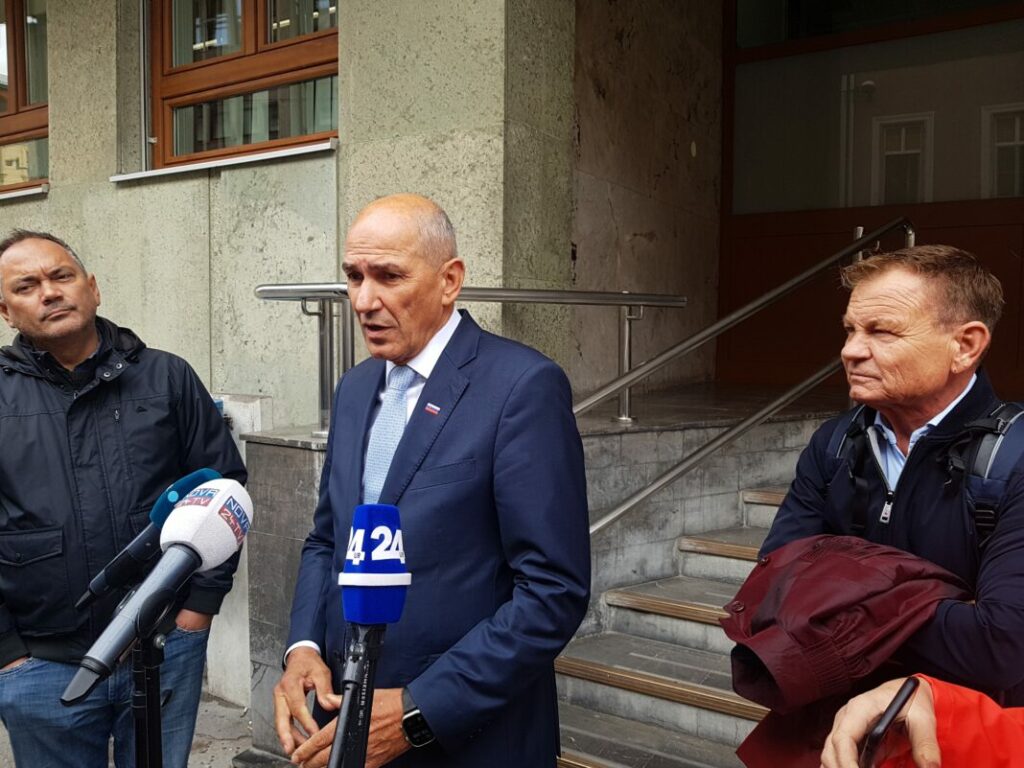Wednesday’s hearing of witnesses marks another chapter in the marathon Kafkaesque Trenta trial. While the hearing of witnesses did not bring any dramatic new developments, it became clear that the transaction in the Trenta case – the sale of the property to the company Eurogradnje, which then sold it to the company Imos – was not considered controversial by anyone at the time.
Boštjan Valenčič, one of the prosecutors in the trial against Janez Janša, Klemen Gantar and Branko Kastelic, continues to argue that there was deliberate abuse in the transaction, which he claims brought Janša 120,000 euros in additional profits, which exceeded the valuation of the property he was selling at the time – the appraiser from the company Imos valued the property at only 20,000 euros. According to the prosecutor, the property was later used for the purchase of Janša’s apartment.
The Specialised State Prosecutor’s Office, in which prosecutor Luka Moljk is also involved, is convinced that this was a sham deal to help Janša get the apartment, as the 15,000 square metre plot of land was worth much less than Imos paid for it, due to restrictions within the Triglav National Park. The prosecution is also referring to the appraisal of Nikolaja Kogovšek Gilčvert, who was questioned on Tuesday and who, as she said at the hearing, carried out the appraisal as a forensic appraiser on the instructions of Mitja Majnik, the director of the Imos company at the time. She denied, however, that she was requested to carry out the valuation by the accused, Branko Kastelic.
Nikolaja Kogovšek Gilčvert was employed by Imos from 1989 to 2004, serving as Project Manager until 2001, before which she carried out thousands of property valuations herself, some of them for her employer. For many years, until 2018, she worked as a forensic expert in the field of construction and real estate.
The first to testify was Tone Kozelj, the bankruptcy trustee of the company Eurogradnje, who knew practically nothing about the Trenta business. He had reviewed the documentation but found nothing controversial in this respect. It was mentioned that some money had been transferred to Janša in the spring of 2005, but that this was followed by a reverse transfer from Janša to the company.
Gregor Bajc, a former representative of the supervisory board of Imos from 2011 to 2013, in a rather sketchy testimony, said that his memory had largely left him, so that he did not remember anything else apart from what he told the criminal investigators at the time. Bajc’s testimony, however, upset the prosecutor, who wanted to have Bajc confronted with Danica Vrtačnik, former chairwoman of the supervisory board of Imos. The latter testified separately and explained that at the time of the purchase of the property in Trenta, Imos was financially booming, and the purchase was a normal occurrence.
There was enough money at the time, so they did not look into the case. She added that this transaction was not to blame for Imos’s subsequent financial difficulties. The purchase of the property, worth 150 thousand euros, which was the cost of the Trenta estate, was, in her view, a more marginal deal, as the company had real estate worth 25 million euros at the time, and the Director-General did not need the Supervisory Board’s authorisation for smaller transactions.
The President of the Chamber, Cvetka Posilovič, was very active in asking questions of the witnesses, as she asked more questions than the two prosecutors and all the legal representatives of the accused put together. So, in fact, she acted almost as the chief prosecutor. The examination of witnesses will continue next Thursday, on the 25th of September.
After the hearing, Janša told reporters that it was Valenčič who had made it possible to delay the Trenta case, and the judge was trying to make a huge trial out of it by reading back all the testimonies so far, which was unprecedented. “Just this week, we have seen that the houses in Murgle, for which the owners paid less than I paid for the property in Trenta in 1992, have already reached a value of one million euros. I wonder when the Slovenian prosecutor’s office will initiate proceedings against those who bought these houses.” He finds it ironic that he now has to defend himself against the accusation that he bought and sold something at its current market value. “At the same time, we have corruption and suspected crimes happening in relation to the buildings that house the courts,” he recalled, noting that the Litijska courthouse affair is just the tip of the iceberg, and the investigation is going nowhere. And in the latter case, it is Valenčič who is directing it.
Janša also noted that everything was being directed towards the questioning of the appraisers from the Association of Appraisers, which had been excluded because of bias in the judicial investigation. He also recalled that the Minister of Justice, Andreja Katič, had in the past arranged for the purchase of the court building for two million euros more than its market value. However, the renovation of the court building in Jesenice, where five judges work, cost the taxpayer 3500 euros per square metre, which means that this cost amounted to twice as much as what a new building would cost. “But here we are being prosecuted for something that is far from being a crime,” he said.
Gašper Blažič
This article was originally published in Demokracija


